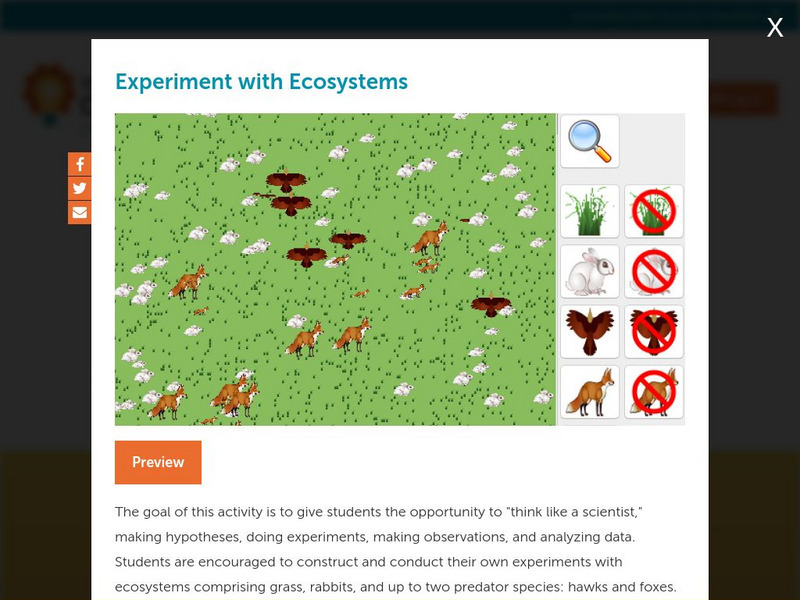Hi, what do you want to do?
Curated OER
Acute Toxicity: LD50 by the Numbers
High schoolers observe brine shrimp as they are affected by household cleaners, develop observation scale, collect and analyze data, and discuss how household products and pesticides negatively impact environment.
Curated OER
Power, Pollution, Pros and Cons
Students review what they know about non-renewable energy, compare and contrast advantages and drawbacks of each type, such as cost of energy sources, feasibility, air pollution, water pollution, and other risks, and create table listing...
Curated OER
Science: 4 X 4
Students generate four statements and four questions based on their current level of understanding of the article from the engage lesson. They
evaluate the statements and questions that they have generated and those of their classmates...
Curated OER
Polishing the Petoskey
Students select a stone and polish it. Throughout the process they demonstrate an understanding of rocks and fossil formation.
Curated OER
The Wildland/Urban Interface Dilemma
Young scholars examine all sides of the issues surrounding wildland fire. Groups assume the roles of different people who must decide what to do about a fictitious wildfire. They have a discussion to analyze the issue. A good, real life...
Curated OER
Animal Habitats and Their Management
Pupils review components present for a quality animal habitat and then explore a goose pond to find out what animals reside there. They learn how wildlife managers work with the land so everything can co-exist together.
Curated OER
The Chemistry of Coal
Students investigate the chemistry of coal. This lesson serves as a review of conservation of mass, simple reactions and equation balancing. During the lesson, students research chemical components of coal, as well as environmental...
Curated OER
The Chemistry of Killer Coal
Students research chemical components of coal, as well as environmental health impacts of mining and burning coal. They discuss conservation of mass as it relates to combustion of organic compounds.
Curated OER
Site vs. Situation: Location! Location! Location!
Students examine places with a similar latitude to Alabama, and discuss the importance of a location's site versus its situation. They analyze maps, create a chart, and write a paragraph on the difference between site and situation.
Curated OER
HyperStudio Animal Project
Fourth graders create a HyperStudio project on an animal of their choice. They discuss the animal's habitat and adaptations. They also identify any interesting facts about their animal.
Curated OER
Regions: Meet the Experts Presentation
Students gather information and create a web site on prairies and plains using a variety of resources, including the internet.
Texas Instruments
Texas Instruments: Jason: Island Fox: A Population in Trouble
Examine the relationship between the island fox and golden eagle populations on Santa Cruz Island over a twelve-year period using the TI-73 Explorer to graph and analyze the values.
Scholastic
Scholastic: Study Jams! Science: Ecosystems: Population Growth
Population in areas is most often determined by environmental factors. This video and the test will help ensure understanding of the trends of population growth with scientific evidence.
Concord Consortium
Concord Consortium: Dam Removing: Changes in the Environment Affect Population
What happens to a population when the environment changes? Students remove a dam that divides an ecosystem to illustrate the effects of environmental changes. Students observe and collect data as the grass and then the rabbit populations...
Concord Consortium
Concord Consortium: Stem Resources: Experiment With Ecosystems
Learn what happens to different populations of organisms as their ecosystem changes. Design your own experiment and make your own guesses with what the result will be with this virtual ecosystem. Also experiment with producer/consumer...
Open Ed
Open Ed Sci: 7.5 Ecosystem Dynamics
This unit on ecosystem dynamics and biodiversity begins with students reading headlines that claim that the future of orangutans is in peril and that the purchasing of chocolate may be the cause. Students launch a scientific...
Other
My Science Box: Ecosystem Organization
In this instructional activity, students will learn about the different levels in the hierarchy of ecology and explain the relationships: organism, population, community, ecosystem, biome, and biosphere. They will also discover why...
Population Connection
Population Connection: Population and Environment[pdf]
A paper from the Population Connection that outlines the consequences to the environment if humans continue on the path of overpopulation.
SMART Technologies
Smart: Energy Flow in an Ecosystem
Students learn about Abiotic and Biotic Factors and how they affect the ecosystem in which an animal might live in.
National Geographic
National Geographic: Symbiotic Relationships in Marine Ecosystems
In this lesson students analyze videos to make observations about species, populations, and communities of organisms and discuss their symbiotic relationships. Then they create a hypothetical marine ecosystem and describe the adaptive,...
Concord Consortium
Concord Consortium: Dam Building: How Changes in Environment Affect Population
In this simulation, students build a dam in the middle of a field, dividing an ecosystem in half to illustrate the effects of environmental changes. They watch and collect data as the grass and then the rabbit populations in that region...
PBS
Pbs Learning Media: How Disruptions Affect Animal Populations
Students explore the effects that ecosystem disruptions can have on animal populations. They learn about the disruptions that have driven three species-the Madagascar fish eagle, the Iberian lynx, and the rowi kiwi, to the brink of...
National Geographic
National Geographic: Oil and Bird Populations
After learning about the diversity of wildlife in the Gulf of Mexico, students focus on birds and their patterns of behavior. They then how an oil spill might affect migrating birds, and possible ways to help them in the event of an oil...
























